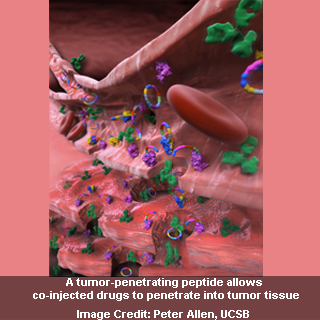
The expert exhibited that in the 1980s, a 3 amino-acid peptide motif i.e. RGD—Arginine-Glycine-Aspartic acid seems to serve as an exceedingly discerning identifier of malignant tissue, fastening to distinctive re-ceptors in the vasculature of cancers. The RGD peptide’s capability to home to tumors has apparently been utilized to plan new compounds for cancer diagnosis and treatment.
Erkki Ruoslahti, M.D., Ph.D., distinguished professor at Sanford-Burnham Medical Research Institute, commented, “Drugs generally have difficulty penetrating tumors beyond a few cell diameters from a blood vessel. This leaves some tumor cells with a suboptimal dose, increasing the risk of both recurrence and drug resistance. The iRGD peptide solves this problem by activating a transport system in tumors that distributes co-injected drugs into the entire tumor and increases drug accumulation in the tumor.”
The new variant of RGD i.e. iRGD apparently merges the RGD motif with a tissue penetration element known as CendR. Similar to the earlier RGD peptides, iRGD homes to tumors, but exposure of the CendR motif when the iRGD is enzymatically cleaved seems to trigger a transport system by means of tumor blood vessel walls into the tumor core. The study team exhibited that combining iRGD to anti-cancer drugs enabled them to pierce deep into tumors, thereby efficiently augmenting the activity of the drugs.
The experts seemed to have made the unexpected finding that anti-cancer drugs may not be required to be chemically fastened to the iRGD peptide for iRGD to increase their effectiveness. Just by co-administering iRGD with a drug may improve the drug’s anti-cancer properties. Co-administration could be even more effectual at providing therapeutic agents inside tumors than conjugating the agents with the peptide. This new paradigm denotes that iRGD may have the possibility to improve the effectiveness of already approved drugs without developing new chemical entities.
Apart from being effectual against human breast, prostate and pancreatic cancer development in mice, iRGD may break through other tumor kinds and could perhaps be used to treat most, if not all, solid tumors. The iRGD peptide was also apparently exhibited to augment the therapeutic effects of numerous kinds of anti-cancer drugs, counting a small molecule drug, a monoclonal antibody and two nanoparticle drugs. Tumors basically resistant to a specific drug seemed to display good responses when the drug was merged with iRGD and tumors partly receptive to another drug were said to be removed by the combination.
The study was published in the Journal Science.
